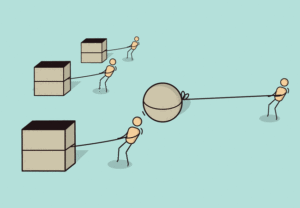Welcome to Week 10 of our Covid-19 fundraising blog. When this all started, we didn’t realize that we’d be at it for ten weeks. Writing a weekly blog is harder than we first imagined. Life is like that sometimes.
Saying you are going to do something is often easier than actually doing it. Let’s face it: for most of us, talking about fundraising is much easier than actually doing it. And somewhere along the line between the talk and the action most of us will look for how to make it easier. We develop tools to make certain tasks go more quickly, and techniques to accomplish things we thought we couldn’t do on our own.
So what are the tools that will make fundraising easier, especially when faced with headwinds from Covid-19 and unknown changes to our national and world economies? Here are three thoughts for Week 10.
1) Success is the greatest agent for change.
Okay, we may have adapted that from others, but the strength of positive psychology is evident, and appropriate to our coronavirus world. We have already mentioned the paralyzing effect of not knowing (Week 7: F.O.N.K.) Success and accomplishment is the antidote to FONK. Focus on what you do well, or what your organization does really well, and forge your way forward to a successful outcome. If there is a recurring theme in our Covid-19 blog posts it is in our encouragement to remain positive.
Experienced fundraisers will make the easiest call first. Successful fundraisers will encourage volunteers to make their own gift first, and to then call on their best prospects second. This approach is focused on generating a successful result at the outset so that the next task can be tackled more readily and from a position of confidence and positivity. It’s about focusing on the essential elements of successful fundraising: be confident in your knowledge of what works and success will follow.
2) Focus on your strengths first.
We wrote about jumping to conclusions last week and sensationalized headlines that focus on the worst (and as we predicted, there were more gloom and doom articles to be found this week). Humans are natural critics, inherently focused on their failings and those of others. If you want to bring out the best in people and help individuals and organizations achieve results, focus on your strengths first. What does your organization do best? Which fundraising appeals meet with the greatest success, which team members reach their goals? Growth and achievement will be found by building on the strengths of your organization’s existing fundraising systems, appeals and people. The current times may call for some adaptations and revisions (read Week 4). For example, if you feel your organization’s greatest fundraising strength is your special event, you have no choice but to adapt (see Week 8: Time to Reverse Engineer the Special Event).
3) Be honest in your self-assessment
It is naturally difficult for an organization’s leadership to see their organization objectively, to identify both the internal and external environmental factors that truly impact fundraising success as well as the fulfillment of the organization’s mission and vision. In times like these, obtaining an experienced and objective external opinion can be of great value. Now may be the best time to listen to that external voice that an experienced fundraising consultant can provide. A good consultant asks the difficult questions, challenges the status quo and entrenched biases, and accelerates a critical self-evaluation and identification of organizational strengths and capabilities that are vital to successful planning and implementation.
Stay positive and focused, and rest assured that our work as professional fundraisers is essential. Be smart, act smart, and stay healthy. Together, we will overcome these challenges.
Recent Blog Posts:
- Week 9: Don’t Jump to Conclusions
- Week 8: Time to Reverse Engineer the Special Event
- Week 7: Living with Covid-19 and Not Knowing
- Week 6: Lessons Learned
- Week 5: Zoom in on better etiquette when video conferencing
- Week 4: Adopt, Adapt, Improve
- Week 3: Working Through the Stages of Change
- Week 2: Shelter In Place and Seeking Balance
- Covid-19: What Should We Be Doing Now?

